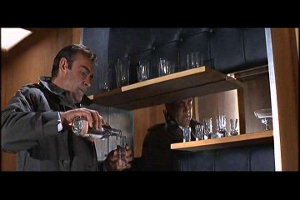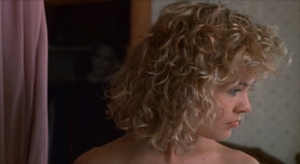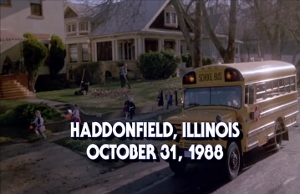Continue reading Halloween: The Curse of Michael Myers (1995)
Tag Archives: Donald Pleasence
You Only Live Twice (1967)

And now we get to talk about Sequelitis. You’d expect the fifth Bond movie to bear some resemblance to its predecessors, but You Only Live Twice can’t seem to help calling attention to its heritage. Personally, I blame Roald Dahl. He should’ve turned this project down from the start. He and Ian Fleming were apparently good friends in real life, but their writing styles couldn’t be further from each other if you placed them on opposites sides of the cosmos. Dahl hated the novel that shares this film’s title and, twenty-one years after the film premiered, flat-out admitted to Starlog magazine “I didn’t know what the hell Bond was going to do.” Producers Albert Broccoli and Harry Saltzman answered by giving him The Formula, whole and (more or less) complete by 1966, at the latest.
As Dahl defined The Formula would go on to define this series:
“Bond has three women through the film: If I remember rightly, the first gets killed, the second gets killed and the third gets a fond embrace during the closing sequence. And that’s the formula. They found it’s cast-iron. So, you have to kill two of them off after he has screwed them a few times. And there is great emphasis on funny gadgets and love-making.”
With this information, the author of Charlie and the Chocolate Factory became the author what is essentially Dr. No 2: In Japan. You can tell how many people actually bother to read Dahl’s work by whether or not they call this film “silly.” Sorry, Charlie, but compared to The Chocolate Factory (published the same year as this film’s eponymous novel) and especially compared to The Glass Elevator, this is Roald Dahl phoning it in after he’s taken a fist-full of horse tranquilizers. And he still managed to create one of the most influential films of the series, large portions of which have become fertile ground for parody, satire and knowing reference. So I come not to bury this fifth Bond film, but to lament what could have been…and argue that, as “silly” as things get in this picture, they could’ve stood to get a whole lot “sillier.” There might be more to recommend. Continue reading You Only Live Twice (1967)
Halloween 5: The Revenge of Michael Myers (1989)

These Slasher sequels are supposed to be simple. Trot out a brace of clay pigeons, watch them all die one by one, tack on some stupid cliffhanger, and you’re all good to go. It seems impossible to screw that up, but by God, Mustapha Akkad found a way. Several, in fact.
The first, Halloween 4, was a complete waste of its own potential, meant to compete with the other Big Names in this sub-genre by copying all their worst eccentricities. By 1989, the Friday the 13th and Nightmare on Elm Street films had long-since surpassed the original Halloween in the popular imagination. They (rightly or not…mostly not) were synonymous with American horror movies of the late-80s, leaving their mutual progenitor in the box office dust.
Akkad couldn’t allow that. Nor could he allow Halloween 5 to pick up where the last left off. Sure, The Revenge begins with a re-staging of The Return‘s final moments, but that somehow makes it worse. Unlike the mouth-breathing audiences Akkad obviously targeted, I actually remember the end of Halloween 4. I hoped it signaled a spark of creativity finally flaring up within this franchise. Nice of Halloween 5 to crush that right out of the gate. Continue reading Halloween 5: The Revenge of Michael Myers (1989)
Halloween 4: The Return of Michael Myers (1988)

In all the history of cinema, Godzilla and Star Trek stand alone as the only franchises in history who’ve managed field strong fourth films (Mothra vs. Godzilla and The Voyage Home, respectively – though this feels like an invitation for everyone to “well, actually” me). One day they will do epic battle for the hearts and souls of nerds the world over. But until then we, their partisans, must content ourselves with taking the piss out of other, less-fortunate film series.
After Halloween III‘s non-success, John Carpenter apparently had an idea: the story about some small town, haunted by the memory of a violent killing spree in its all-too-recent past…rather like Haddonfield, Illinois. It could’ve been an Our Town for the 1980s…except George went insane and murdered his sister Rebbecca at the end Act One, spent the scene break in an asylum, escaped, and spent the whole of Act Three trying to murder Emily. C’mon: you know you’d love to see that. We won’t see it here, but you just know it’d make a better movie. Continue reading Halloween 4: The Return of Michael Myers (1988)
Halloween II (1981)

And here we have a film never should’ve seen the light but, like that three-car pile-up on your way to work, resolutely sits right in the middle of the road refusing to be ignored. The same way most critics ignore John Carpenter’s made-for-TV movies.
Awkward segues aside, there’s two very good reasons to focus on the man’s studio pieces. For (1) they’re better, and for (2) they’re easier to find. Yet in their blindness, critics miss essential facets of Carpenter’s story, which is in many ways the story of genre cinema in the 1980s. That’s sad because it’s a great story in itself…often much more interesting than the films it created. A story littered with greed, betrayal, and compromised aesthetic principals that will probably go on to make a great bio-pic once everyone forgets who Orson Welles was…or, if they remember him at all, remember him only as “the voice of Unicron.” Continue reading Halloween II (1981)
Halloween (1978)
 It’s easy enough to review Halloween. Just prattle on about how scary and haunting adjectival it all is given that twenty years of increasingly-mechanical slasher films have done absolutely nothing to diminish Halloween‘s overall effectiveness. Nothing at all. Do you hear? Rather like I attempted to do in my original review of the film, which appeared somewhere very much like this space way back in the dark, dial-up days of 1999. Don’t look for it: I’ve not touched the thing since I originally put it up, and I’d just as soon it ceased to exist. Bloody Wayback Machine.
It’s easy enough to review Halloween. Just prattle on about how scary and haunting adjectival it all is given that twenty years of increasingly-mechanical slasher films have done absolutely nothing to diminish Halloween‘s overall effectiveness. Nothing at all. Do you hear? Rather like I attempted to do in my original review of the film, which appeared somewhere very much like this space way back in the dark, dial-up days of 1999. Don’t look for it: I’ve not touched the thing since I originally put it up, and I’d just as soon it ceased to exist. Bloody Wayback Machine.
On the other hand, it’s difficult to review Halloween given its lofty position at the event horizon of the American Slasher Film, a cinematic object so dense its sucked down the entire horror genre into an ever-redshifted morass of misogyny, masochism, and mordant self-referencing. Halloween is the film most directly responsible for this ongoing Judgment Day, making it the cinematic equivalent of a supernova. Unknown, it flashed onto the American scene at the decrepit end of the 70s only to collapse in on itself, creating an omnivorous black void from which nothing good can escape. Continue reading Halloween (1978)
